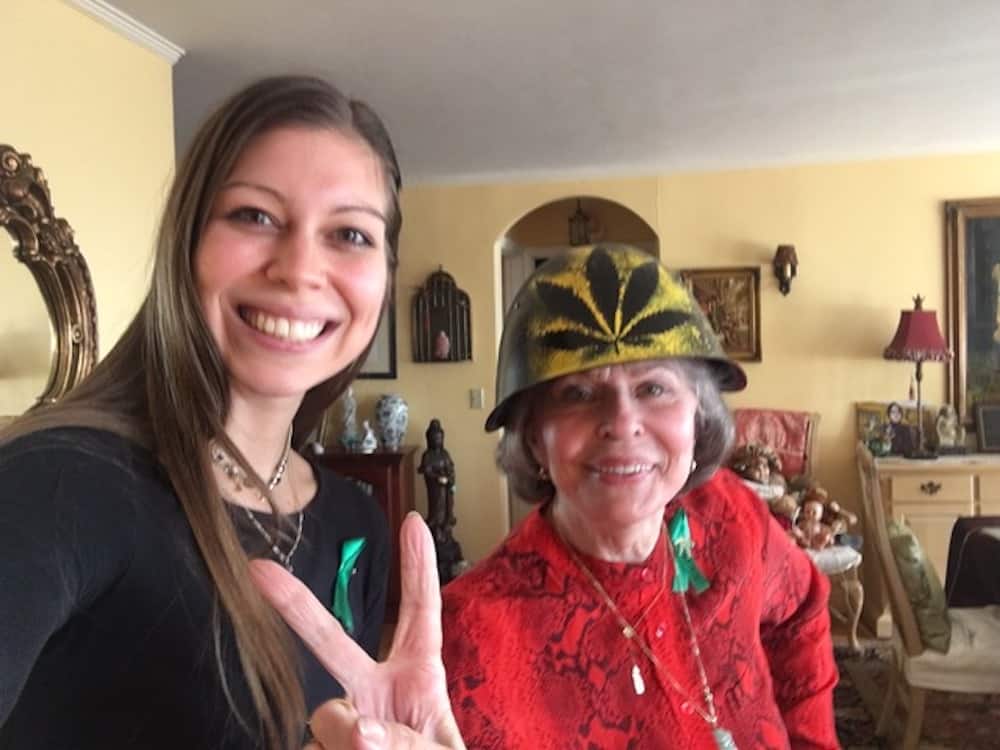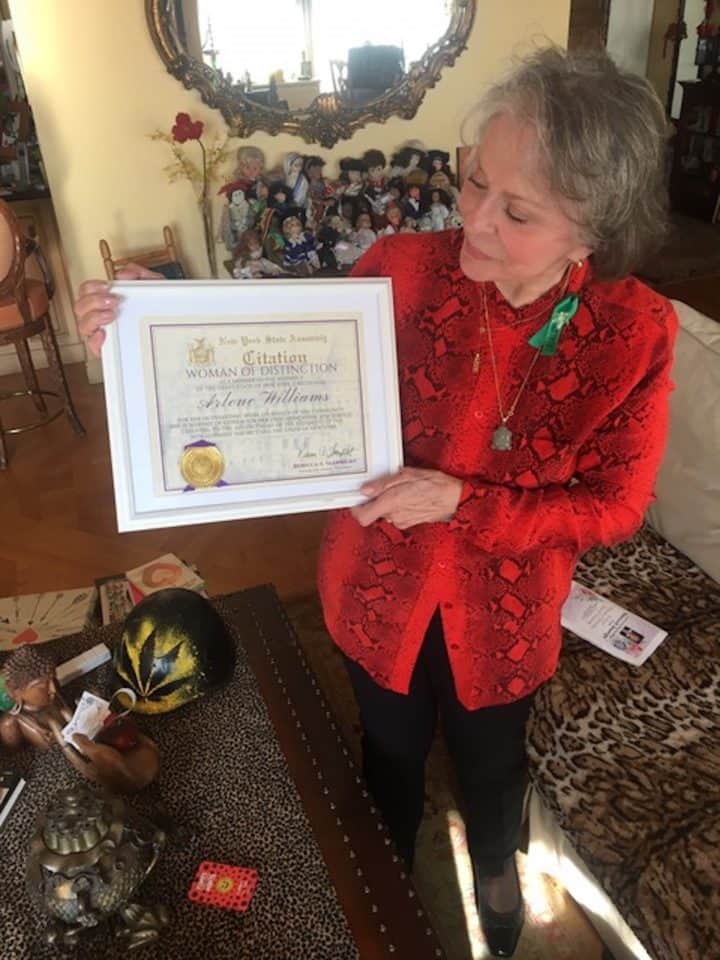Most people who attend the New York Pride Parade each year know who Ganja Granny is: the little old lady walking down 5th Avenue giving out green ribbons and ‘smoking’ a large-scale paper mâché joint behind a banner which reads, “Legalize Marijuana NOW.” But not only is she the group’s bonafide celebrity, she’s also the organizer, promoter, and leader of the pack.
Arlene Williams, an eminent marijuana activist of international scale, has been fighting for the legalization and decriminalization of marijuana in New York City for the last 35 years, but her commitment to improving the lives of others does not stop there. Arlene Williams has also been a major ally to the queer community, a proponent of racial justice, and she was an organizer for the first Women’s March in 2017.

Coffee With The Ganja Granny
I met her for coffee in her apartment, which was populated by China dolls, antique furniture, and a dining table spotted with crocheted pumpkins and spiders for the Halloween season. At first glance she may look like your average lady from the Upper East Side, but Arlene Williams is no ordinary grandma. She wore a red snakeskin print shirt with a green ribbon with the word “legalize” on it, pinned to her shirt with a sparkling pot leaf. She wore two gold necklaces: one with a jade Buddha, and one with the word “love,” and amongst her more traditional decor were Buddhas, bamboo plants, and a treasure chest of ornamental pot leaves.
Arlene Williams was born on “the front lines Detroit,” the daughter of Polish Catholic parents. Her father was an activist during World War II who helped get people out of Poland and into the United States. At the age of 17, she married a Black man, which, in 1954, was still illegal in many parts of the country. She moved to New York in 1962 because, although she had a lovely upbringing, she knew that “Nothing good would happen and nothing bad. Nothing would happen to me there.”
Her first husband was a professional gambler and she went to the craps tables with him often, where there always seemed to be a guy in the background rolling joints for sale. “I didn’t drink, I didn’t smoke, I didn’t really do anything,” she remarked. In those days people had to be very cautious about where they got their marijuana, relying heavily on relationships and contacts because the penalties for getting caught, in many places, were quite severe. According to Williams, “one joint could get you 10 years in Michigan.”
The first time she saw people getting busted for possession was in New York, and unlike others from her generation, Williams was not ignorant of the connections between drugs, race, and law enforcement. Barbara Jackson, a colon cancer survivor who had been self medicating with marijuana got busted by the police way uptown on the west side; “they threw her on the ground, dragged her into the police car, took her to jail,” and all of a sudden she was on the front page of all of the newspapers. Arlene had just moved to New York, and thought, “how the hell—that would not have happened to me… not that it was impossible, but, highly improbable.” Arlene was white and Barbara was a woman of color, and she knew that that made all the difference.
Now, we are all familiar with that feeling, when encountering such blatant injustice, when we say, “I’m gonna write a letter, I’ll make a phone call,” and then you don’t follow through, “but I did that day.” Arlene called the attorney general to confront the blatant racism evident in Ms. Jackson’s arrest, and fortunately the case was thrown out. Soon after, Barbara jokingly and affectionately gave her the nickname “Ganga Granny,” and it immediately hooked on: “I stopped using my own name and decided no, it’s time now to really go public.”
Arlene Williams and AIDS Activism
Arlene began smoking more frequently in the 1970’s with her second husband who “smoked day and night,” but then everything changed in September of 1980 when she was diagnosed with breast cancer. “When you hear the word ‘cancer’ you hear death, and I really, was willing to do anything. I had my kids, I had my grandson, I wanted to see them grow up.” She, like many other Americans, tapped into the healing powers of marijuana, “smoking [her] way into good health.” Even so, she has not, nor has she ever, had the desire to shove her views down your throat: “I have yet to tell anyone in a speech that it cured me. I will not say it will cure you. I don’t know what it will do for you. I know what it did for me. It’s like any medicine. And recreationally, I think it’s great.”
But the 1980’s brought more than one life-changing event to Arlene Williams’ life. She came across a documentary on Mother Teresa that really inspired her to volunteer her time to helping others, and when she saw that Mother Theresa ran an AIDS Hospice in the Village called the Gift of Love, she started volunteering there right away, beginning a journey that would last for the better part of 10 years.
“The pot came in handy there. The guys couldn’t eat, they were in pain, and in those days when you bought marijuana it was full of seeds and you’d have to strain it to get all the seeds out. It took a pound of seeds, and a stick of butter, and you’d cook that down, and the residue had enough THC in there to put into a recipe. It was a lot of work! To make whatever it took to get them to eat. We got the patients from prisons and off the streets, people you would normally probably have run from, but I was drawn to them.”
She talked about how many of the patients in the AIDS hospice would remark that they were actually glad they had AIDS. “Who’s glad to have AIDS?” she said, becoming very animated. “It was because it took AIDS to get them to this point in time in their life to know someone cared. Some of them had been drug addicts at 7 or 8 years old. Some were gay, some were drug addicts, and some were gay drug addicts.”
She lost many friends to the AIDS crisis, but even so she regards this period as “one of the best times of my life, because I felt like I was really doing something, and it was an education. I learned how to hotwire a car because of these guys. I learned a lot from them.”
So in her “own quiet way,” Arlene began talking to people about legalization. She remarked that, although people generally approved of the use of marijuana, especially for medical use, “no one would come out publicly and say anything.” Many of us in 2019 forget that allying yourself to marijuana in any way used to come with major consequences: everything from public shaming to losing your job. Many of the Yippies used to wear t-shirts with pot leaves in them as their political uniform, but to Arlene, this was not only much too casual, but much too off-putting, and paired with the Yippie’s extensive use of crude and vulgar language, was too much for marijuana’s quieter supporters, including politicians and people from the middle and upper classes.
“It would take money, lobbying, time, and effort,” she said, and alienating people with power and money was a pretty bad way to go. It was then that Arlene traded in her Cheech and Chong t-shirts for a green satin ribbon: “I thought about the red AIDS ribbon, and I made the green ribbon with the word ‘legalization.’ This opened doors in a different way.”
The green ribbon is one of the most iconic symbols of the push to legalize; I think its success is directly tied to its clear yet subtle nature which does not rely on pot culture for attention.

The Future of The Flower
Even though the stigma against marijuana is lessening, and legalization is moving steadily forward state by state, Arlene knows that the fight is far from over: “We have federal law, international law. It’s not legal in so many countries because of Nixon and the drug wars.” She went on to mention the problems with dosage, not knowing how much to take and not knowing how accurate the labels are, neither of which can be improved without lab testing and government regulation. But even so, Arlene remains hopeful and passionate, declaring that change has happened and change will come “if we really work hard, if the people on the peripheral call their politicians, their representatives, write letters, text them and email them.”
“We need them!” she said, “There’s no way one person can pull this off.”
Although, if any one person could do it, it would be Arlene Williams.
“The day of standing behind our men is over,” she said when I asked her about the challenges of being one of very few women who have been involved in legalization since the beginning, “but we don’t want our man standing behind us either. We want to stand with him, or whoever our partner is. We want to be in this together. And if it’s about taking down Trump or the White House, or whatever we’re trying to do, making marijuana legal again, we have to do it together. We can’t stand apart. Everybody’s gotta come out of their smoke-filled closets and link arms.”
Arlene Williams was honored as a 2018 “Woman of Distinction” by the New York State Assembly for community work on the Upper East Side. No woman, let alone a woman involved in legalization, gay rights, women’s rights, and racial justice, had ever received an award from such a distinguished place.
The post The Time To Stand Together Is Now: A Chat With Arlene Williams, The Ganja Granny appeared first on High Times.



0 DL LiNKS:
Post a Comment
Add yours...